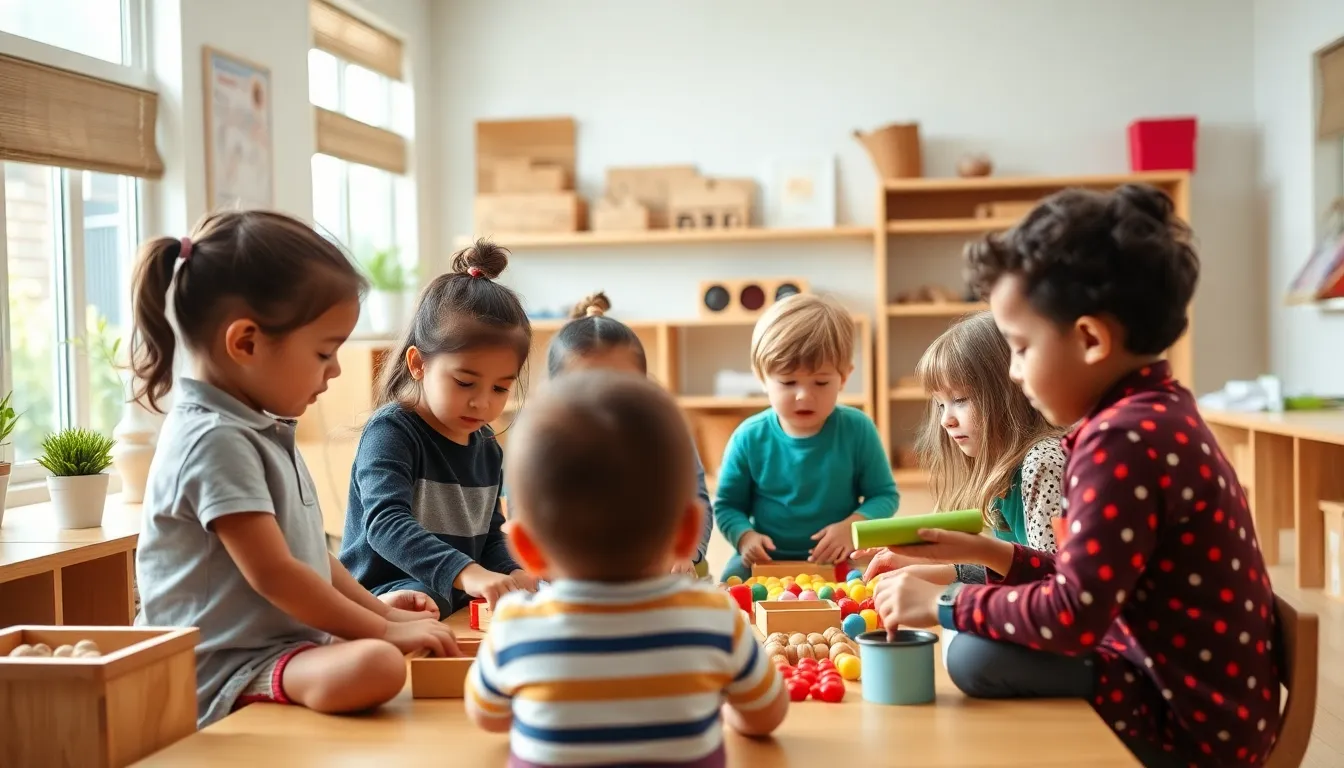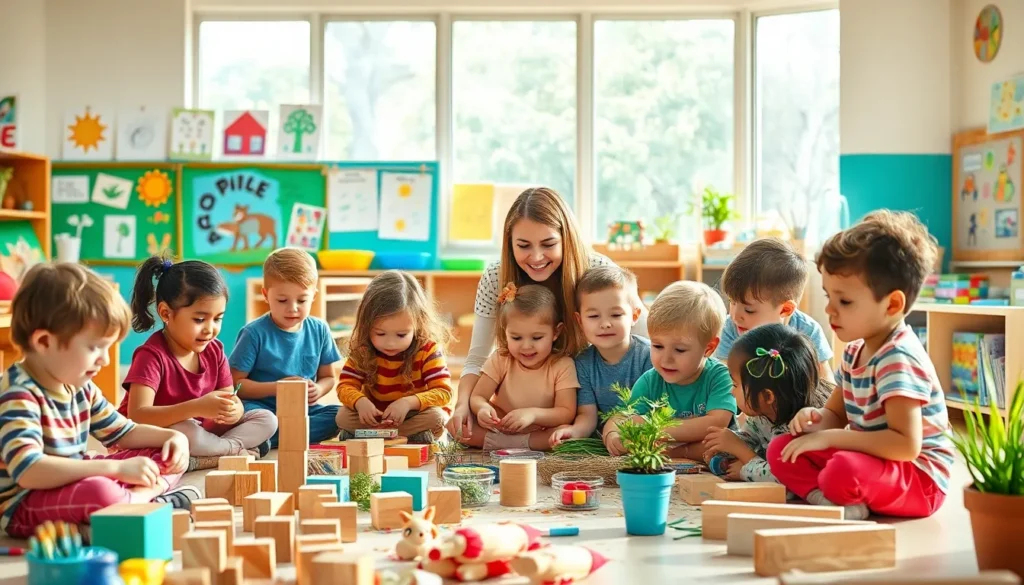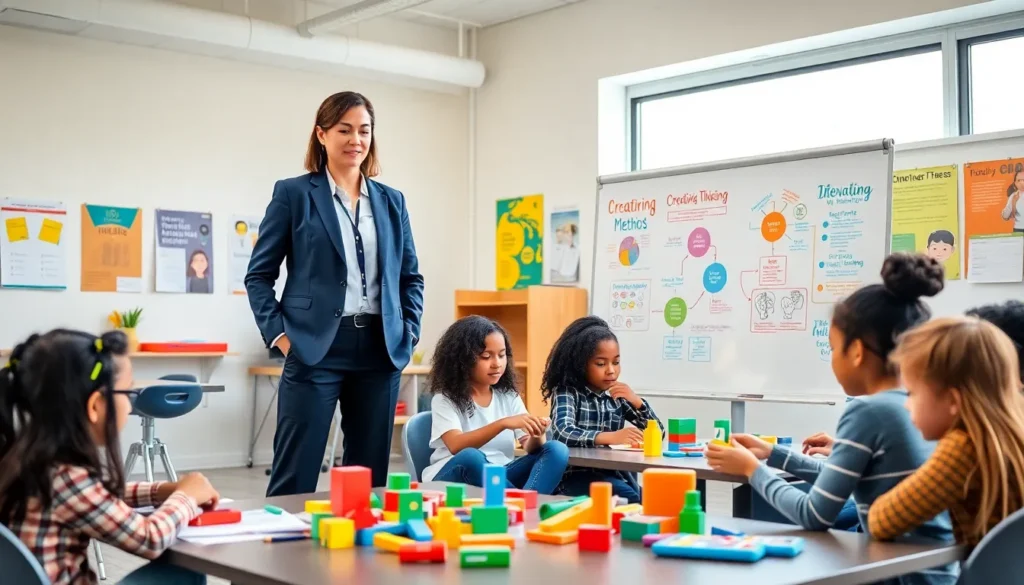Table of Contents
ToggleIn a world where traditional education often follows a one-size-fits-all approach, alternative education philosophies are gaining traction. These innovative methods challenge conventional norms, offering diverse pathways for learners of all ages. From Montessori to Waldorf, each philosophy presents unique principles that cater to individual needs and foster creativity, critical thinking, and personal growth.
As parents and educators seek more effective ways to engage students, understanding these alternative approaches becomes essential. They not only provide flexibility in learning styles but also emphasize the importance of holistic development. By exploring various philosophies, one can uncover the potential to transform the educational landscape and empower learners to thrive in an ever-changing world.
Overview of Alternative Education Philosophies
Alternative education philosophies address the limitations of traditional education methods. They prioritize individualized learning experiences, fostering students’ unique talents and interests. Various philosophies underpin these approaches:
- Montessori Method
Montessori education promotes self-directed learning and hands-on experiences. Children engage with materials at their own pace. Mixed-age classrooms encourage peer learning and social interaction.
- Waldorf Education
Waldorf philosophy focuses on creativity and imagination in learning. It emphasizes a developmentally appropriate curriculum that nurtures artistic expression and critical thinking. Curriculum topics integrate arts, music, and outdoor activities to engage students.
- Reggio Emilia Approach
The Reggio Emilia approach values children’s input and collaboration. It encourages exploration through project-based learning. Educators act as facilitators, guiding students in their inquiries and supporting their interests.
- Sudbury Schools
Sudbury schools promote total student autonomy over learning experiences. Students create their schedules and choose their subjects. The philosophy fosters self-motivation and personal responsibility.
- Unschooling
Unschooling allows children to follow their interests and learn through real-life experiences. It rejects standardized curricula, promoting flexibility and spontaneity in learning. Parents act as resources but do not impose a structured educational plan.
Each alternative philosophy offers distinct methods that can adapt to diverse learner needs. Understanding these frameworks helps parents and educators make informed decisions about educational pathways. These approaches aim for holistic development, preparing students for the complexities of modern life.
Montessori Method

The Montessori Method emphasizes self-directed learning and individualized education, adapting to each child’s unique learning style. It promotes hands-on experiences in a carefully prepared environment, enabling children to explore and learn at their own pace.
Key Principles
- Child-Centered Learning: Prioritizes the interests and abilities of children, allowing them to choose activities that resonate with them.
- Mixed-Age Classrooms: Groups children of different ages together to foster peer learning and social interaction.
- Prepared Environment: Provides a structured setting filled with materials that encourage exploration and independence.
- Auto-education: Encourages students to learn through their own experiences, facilitating natural curiosity and discovery.
- Respect for the Individual: Acknowledges each child’s unique developmental pace and learning preferences, promoting self-esteem and confidence.
Benefits and Challenges
| Benefits | Challenges |
|---|---|
| Encourages independence and self-motivation | Requires well-trained teachers to implement effectively |
| Fosters critical thinking and problem-solving | May lack standardized assessment methods |
| Enhances social skills through peer interaction | Limited availability in some regions |
| Supports holistic development | Initial costs for materials and training |
Waldorf Education
Waldorf Education, founded by Rudolf Steiner in the early 20th century, emphasizes a holistic approach to learning. It fosters creativity and imagination while integrating arts and nature into the curriculum.
Core Concepts
Waldorf Education features several core concepts that differentiate it from traditional schooling:
- Developmentally Appropriate Curriculum: Wholesome lessons align with the developmental stages of children, incorporating storytelling, arts, and movement.
- Emphasis on Imagination: The curriculum nurtures imagination through creative activities like painting, music, and drama, helping students to think outside the box.
- Integrated Learning: Subjects interlink, with themes connecting subjects like history and literature through interdisciplinary projects.
- Nature Connection: Outdoor activities and environmental education enhance awareness and appreciation of nature, fostering a sense of responsibility towards the environment.
- Community Engagement: Parents and teachers collaborate to create a nurturing environment, emphasizing community involvement as crucial for education.
Impact on Child Development
Waldorf Education significantly impacts child development, focusing on emotional, social, and intellectual growth.
- Emotional Development: Creativity and imagination foster self-expression, building emotional intelligence and resilience.
- Social Skills: Collaborative projects enhance teamwork and communication skills, essential for social interaction.
- Critical Thinking: Integrated learning encourages analysis and problem-solving, promoting critical thinking skills necessary for future challenges.
- Lifelong Learning: The emphasis on intrinsic motivation fosters a love for learning that persists throughout life, preparing students for ongoing personal and academic growth.
- Balanced Development: The holistic approach ensures balanced development across artistic, academic, and practical skills, supporting well-rounded individuals ready for diverse life paths.
Unschooling
Unschooling represents a unique approach to education, prioritizing learner-led experiences over traditional structured curricula. It encourages students to pursue their interests and learn through everyday life.
Philosophy and Approach
Unschooling centers on the belief that individuals learn best when they’re free to explore topics that ignite their passions. The approach emphasizes real-life experiences over formal instruction, allowing learners to gain knowledge through activities such as traveling, engaging in hobbies, or participating in community projects. Key principles of unschooling include:
- Learner autonomy: Students choose what, when, and how they want to learn, fostering a sense of ownership in their education.
- Natural learning: Learning occurs organically through daily interactions and experiences, without a prescribed curriculum.
- Mentorship: Parents or adult mentors support learners, guiding them rather than directing their educational paths.
This approach nurtures a love for learning by allowing students to connect with their interests on a deeper level.
Pros and Cons
Unschooling offers various advantages and challenges.
Pros:
- Enhanced motivation: Learners often display higher engagement and enthusiasm when studying topics they select.
- Development of critical thinking: Real-world problem solving fosters creativity and innovative thinking.
- Adaptability: Students develop skills to adapt to changing circumstances and acquire practical knowledge relevant to their lives.
Cons:
- Lack of structure: Some learners may struggle without a structured environment, possibly leading to incomplete knowledge in essential subjects like math or science.
- Socialization concerns: Critics argue that unschoolers may miss opportunities for interaction with peers in conventional settings.
- Parental responsibility: Parents must invest time and effort into facilitating experiences, which can create challenges for those with limited resources.
Unschooling presents a distinct alternative within the landscape of education, focusing on learner agency while weighing its benefits and potential drawbacks.
Reggio Emilia Approach
The Reggio Emilia Approach is founded on the belief that children are competent and capable learners. It emphasizes collaboration, communication, and exploration through project-based learning, enriching the educational experience by valuing children’s voices and ideas.
Educational Focus
The Reggio Emilia Approach focuses on fostering children’s innate curiosity by encouraging inquiry-based learning. Learning emerges from children’s interests, guiding educators to create engaging educational experiences. Key components of this approach include:
- Project-based learning: Projects allow children to explore topics in-depth, promoting critical thinking and problem-solving skills.
- Documentation: Educators document children’s progress through observations, photos, and videos, providing insight into individual and group learning processes.
- Environmental design: Classrooms are intentionally designed to stimulate exploration and creativity, integrating natural materials and flexible spaces.
Such educational strategies cultivate an environment where children can express themselves, collaborate with peers, and construct knowledge actively.
Community and Parental Involvement
Community and parental involvement are central to the Reggio Emilia Approach. Educators view families as essential partners in the educational process, encouraging collaboration and open communication. Key elements include:
- Parental engagement: Parents participate in school activities, providing insights and contributing to children’s learning experiences.
- Community connections: Schools foster relationships with local organizations, enabling access to resources and enriching learning opportunities.
- Shared responsibility: Educators, families, and the community co-create a supportive environment that nurtures children’s development.
Through these collaborations, the Reggio Emilia Approach strengthens bonds between students, families, and the community, enhancing the educational experience and promoting holistic growth.
Alternative education philosophies provide innovative pathways for learners seeking personalized and engaging educational experiences. By prioritizing individual needs and fostering creativity these approaches challenge traditional norms and promote holistic development. Each method offers unique strategies that empower students to take charge of their learning journeys.
As parents and educators explore these philosophies they can better support diverse learning styles and prepare students for an ever-changing world. Embracing alternative education not only enriches the educational landscape but also cultivates a generation of adaptable and resilient learners ready to thrive in various life paths.




